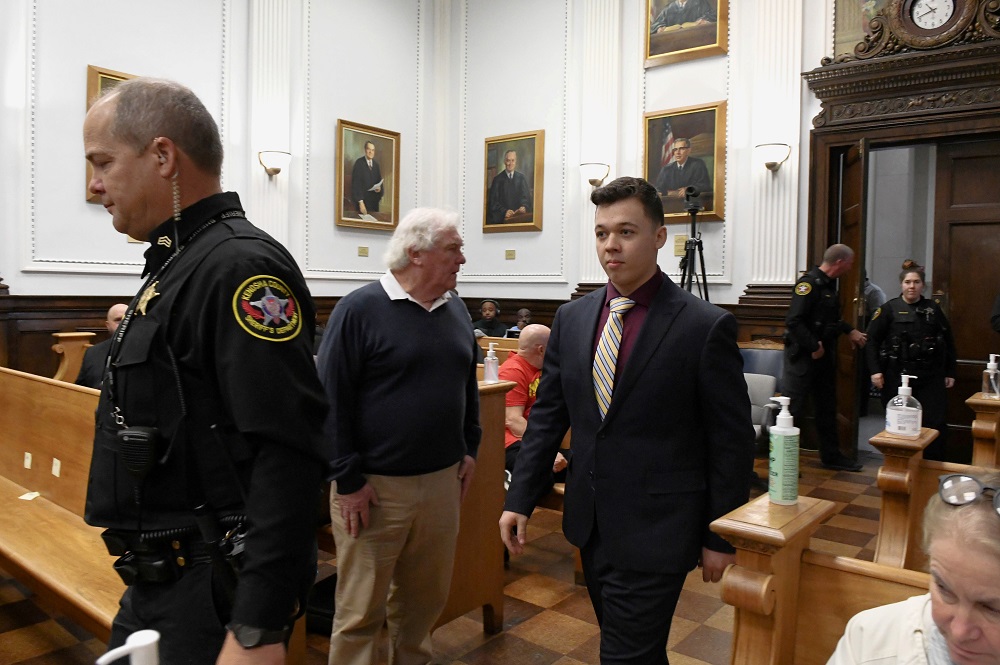Defendant Travis McMichael stands as the jury enters the room during his trial at the Glynn County Courthouse, in Brunswick, Georgia November 8, 2021. — Reuters pic
WASHINGTON, Nov 15 — The United States is bracing for the outcome of two high-profile trials featuring a volatile mix of guns, self-defense claims and racial tensions.
One of the cases is being tried in the town of Brunswick in Georgia, a southern state with a segregationist past.
Three white men are on trial for shooting and killing Ahmaud Arbery, a Black jogger, on February 23, 2020 after chasing him through their neighborhood in pickup trucks.
Gregory McMichael, his son Travis and their neighbour William Bryan say they were attempting to make a “citizen’s arrest” of a man they suspected of being a burglar.
Arbery’s family and supporters have called it a modern day lynching.
The other case is taking place 1,000 miles (1,600 kilometers) away, in the Wisconsin town of Kenosha.
The town near the Great Lakes was rocked in August 2020 by protests and rioting after police shot and severely wounded a Black man.
During a third night of unrest, Kyle Rittenhouse, a 17-year-old with an AR-15 semi-automatic rifle, joined groups of other armed men to patrol the streets and protect, as they put it, businesses from arsonists and looters.
Rittenhouse ended up shooting two men dead and wounding another. Charged with homicide, the young man is claiming self-defence.
While the details of the cases differ, both involve what has become an “American norm” of “civilians toting around firearms to protect their neighbourhoods,” said Caroline Light, a professor at Harvard University who has written a book called Stand Your Ground: A History of America’s Love Affair With Lethal Self-Defense.
“It has taken hold in the hearts and minds of Americans that armed self-defense is a right and a duty of so-called good citizens,” Light told AFP.
This notion is “at the very root of the nation,” from the arrival of the first European settlers, Light said, and a right to self-defence has been codified in the laws of a number of states under pressure from the gun lobby.
“But it disproportionately puts the right of weaponised violence, the rights of armed violence, into the hands of white, predominantly men,” Light said.
“And people of colour, especially Black men, are in the crosshairs of violence,” she said, “because there is this idea that you protect your neighbourhood against threats, and that the threat is seen as Black.”
‘Black Lives Matter’
A video of Arbery’s shooting added fuel to the Black Lives Matter protests which erupted following the May 2020 death of George Floyd, a 46-year-old Black man killed by a white police officer in Minneapolis, Minnesota.
“A Black man should be able to go for a jog without fearing for his life,” President Joe Biden tweeted on the anniversary of Arbery’s death.
Kyle Rittenhouse is led by Kenosha County Sheriff Bill Beth as he re-enters the courtroom after the morning break during his trial at the Kenosha County Courthouse in Kenosha, Wisconsin November 11, 2021. – Reuters pic
Rittenhouse has also become an icon though on the conservative right, among those who condemned the protests against racial injustice and police brutality as being the work of Antifa or “anarchists.”
In this politically- and racially-charged context, the prosecutors in the two cases have been walking on eggshells.
Thomas Binger, the prosecutor in the Rittenhouse case, stressed to the jury that he was not questioning one’s right to legitimate self-defense.
Linda Dunikoski, the prosecutor in the Arbery case, has not outright accused the McMichaels and Bryan of racism in pursuing the Black man but said they were operating on the basis of “assumptions.”
It took nearly three months for the McMichaels and Bryan to be arrested and they were charged only after a video of the shooting of Arbery was leaked online and sparked outrage.
Rittenhouse left the scene the night of the shooting and later turned himself in to police.
There is only a single Black juror hearing the Arbery murder case and the judge in the trial of Rittenhouse has refused to allow prosecutors to describe the men he shot as “victims.”
Closing arguments in the Rittenhouse trial are scheduled to begin on Monday and many court observers expect he could be acquitted in line with the strict self-defence laws in the state of Wisconsin.
“There will be widespread frustration and outrage,” Light said of a possible acquittal. “I think we can expect to see a lot of protests.”
In Georgia, regardless of the verdict, the McMichaels and Bryan will face federal hate crimes charges next year. — AFP

